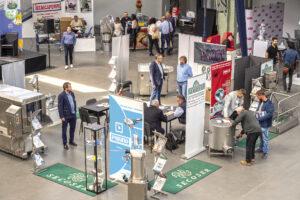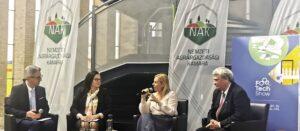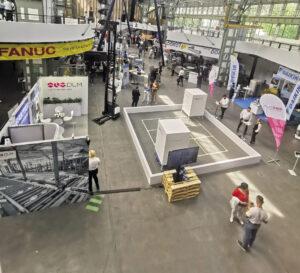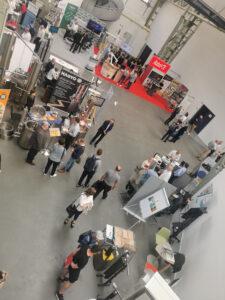FoodTechShow: investing is a must
On 9-10 April the Hungarian Chamber of Agriculture (NAK) organised its FoodTechShow at Millenáris. More than 60 exhibitors showcased nearly 150 innovative technologies and machinery for the representatives of the Hungarian food industry.
This article is available for reading in Trade magazin 2024/6-7
Both small-scale and complex developments
For the period 2021-2027, HUF 750bn is available to finance development projects in the sector.
“To succeed you will need more than financial resources and credit, you also have to have a good business plan”,
told Tamás Éder, food industry vice president of NAK. In order to ensure the successful implementation of investments, NAK organised the FoodTechShow, a machinery and technology exhibition for its members and companies from other sectors that are investors in the food supply chain, with the participation of national and international machinery manufacturers and distributors, plus cooperating professional organisations.

Az első FoodTechShow-n több mint 60 kiállító közel 150 innovatív technológiát mutatott be
The trade show gave firms the opportunity to see state-of-the-art technologies, machinery and equipment. There were also presentations, roundtable discussions and workshops. Special attention was given to Industry 4.0 solutions, digitalisation, automation, and robotics as the drivers of competitiveness.
In the roundtable discussion following the introduction, Dr Anikó Juhász, deputy state secretary for agriculture spoke about the Common Agricultural Policy Strategic Plans, which will include two new calls for proposals. Dr Beáta Olga Felkai, deputy state secretary for food industry and trade policy stressed: from the small-scale development budget, applicants can get a maximum funding of HUF 200m up to a HUF 50bn framework, while for complex developments minimum HUF 200m and maximum HUF 5bn is available up to a HUF 150bn framework.

The two days of the first-ever FoodTechShow featured a series of roundtable discussions with experts on a variety of topical issues of importance to the industry (photo taken at the first such discussion after the opening)
Artificial meat on the dinner table?
The topic of the next roundtable discussion was the latest trends in the domestic food industry.
Dr Marietta Kiss, head of department at the University of Debrecen highlighted the importance of sustainability and health-consciousness, and analysed the growing popularity of plant-based products. A focus group survey of Hungarian consumers revealed that 80% consider lab-grown dairy and meat products unnatural, and only a few percent would definitely try these products.
Dr Gedeon Totth, member of the presidency of the Hungarian Marketing Association (MMSZ) discussed changes in consumer behaviour, speaking about the phenomenon of tribalism: marketing experts will have to say goodbye to traditional segmentation techniques, as people with different diets come from different backgrounds, knowledge and preferences.
Katalin Neubauer, secretary general of the Hungarian National Trade Association (MNKSZ) mentioned that that a rapid change in consumer habits poses significant challenges for retailers, and forecasting is extremely difficult today.
Ready-to-eat vs. health
Dr László Friedrich, institute director of the Hungarian University of Agriculture and Life Sciences (MATE) talked about the importance of preserving the freshness and the shelf life of food. In Hungary there is a growing demand for convenience products, including higher priced ready-to-eat foods, especially among young people. The objective is to make these products healthier in the long term. A roundtable discussion on the second day of the Foodtech Show looked at the first steps towards the digitalisation and automation of the food industry. Dr László Baranyai, head of department at MATE, Balázs Bognár, managing director of SOMAPAK Kft., Norbert Haray, division manager of ABB Kft., József Maczenkó sales engineer at FANUC Hungary Kft. and Dr Gábor Vicze, the CEO of Innomine Group Kft. discussed the use of data analytics and robotics in the food industry. Dr Gábor Vicze pointed out that the first step in the digitalisation journey is to assess the current state of the company. József Maczenkó underlined the importance of in-house experts, system integrators and consultants.
Pilot project followed by a step by step process
Participants highlighted the role of EU grants and innovation hubs, which offer opportunities to launch pilot projects and programmes. This allows companies to test new technologies in a risk-free and controlled environment before they are fully deployed. The speakers emphasised that the digitalisation process isn’t an immediate transformation, because it requires a strategic, step-by-step approach. Roundtable participants mentioned the role of education and training in the success of digitalisation processes. Dr László Baranyai called attention to universities and vocational training institutions having a key role in providing training that responds to the needs of the labour market of the future.

For NAK, it is particularly important to support the development prospects of the food industry, such as investments in innovative technologies, automation and robotisation.
Packaging: so many new rules
There is a lot of new regulation in packaging, such as the pending Packaging and Packaging Waste Regulation (PPWR) of the European Union, the Extended Producer Responsibility (EPR) scheme or the Single-Use Plastics (SUP) Directive. The next roundtable discussion explored these issues, with the participation of Beáta Gönci, secretary general of the National Association of Packaging and Materials Handling (CSAOSZ), Miklós Nagy, technical secretary of CSAOSZ, Attila Vörös, managing director of the Federation of Responsible Food Manufacturers (FÉSZ) and Tibor Baranyai, managing director of GEA Hungary Kft. and Dr Eszter Fogarassy, food production group leader of the Hungarian Chamber of Agriculture (NAK) as the discussion’s moderator.

The exhibition focused on Industry4.0 solutions, digitalisation and automation
The experts agreed that stricter rules and the introduction of new technologies can lead to significant cost increases. Regulations are becoming stricter, with targets to reduce packaging waste by 5% by 2030, 10% by 2035 and 15% by 2040. According to the new rules, it will be forbidden to market packaging with a recycling rate below 70% from 2030. //
Related news
János Lázár: rural development is needed, not agricultural policy
🎧 Hallgasd a cikket: Lejátszás Szünet Folytatás Leállítás Nyelv: Auto…
Read more >Related news
MOHU: 5,200 return points are in operation, but 47 larger settlements still do not have RE points – public “enema” machines may be introduced
🎧 Hallgasd a cikket: Lejátszás Szünet Folytatás Leállítás Nyelv: Auto…
Read more >GDP growth in OECD member countries slowed to 0.3 percent in the last quarter of last year
🎧 Hallgasd a cikket: Lejátszás Szünet Folytatás Leállítás Nyelv: Auto…
Read more >









